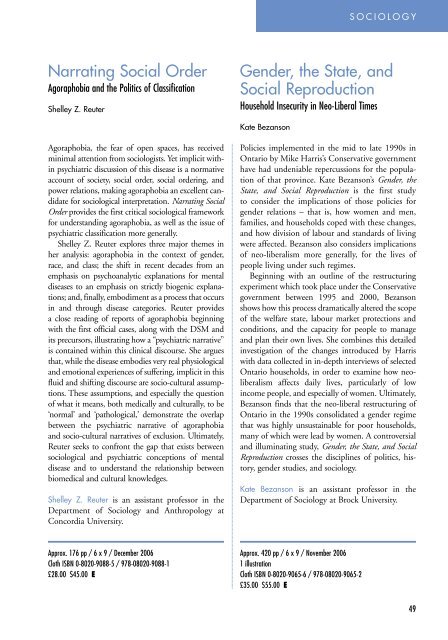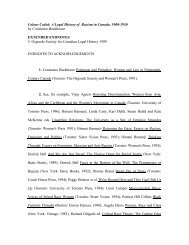Fall/Winter 2006 - University of Toronto Press Publishing
Fall/Winter 2006 - University of Toronto Press Publishing
Fall/Winter 2006 - University of Toronto Press Publishing
You also want an ePaper? Increase the reach of your titles
YUMPU automatically turns print PDFs into web optimized ePapers that Google loves.
G E N E R AS OL CI NI OT EL RO EG SYT<br />
Narrating Social Order<br />
Agoraphobia and the Politics <strong>of</strong> Classification<br />
Shelley Z. Reuter<br />
Gender, the State, and<br />
Social Reproduction<br />
Household Insecurity in Neo-Liberal Times<br />
Kate Bezanson<br />
Agoraphobia, the fear <strong>of</strong> open spaces, has received<br />
minimal attention from sociologists. Yet implicit within<br />
psychiatric discussion <strong>of</strong> this disease is a normative<br />
account <strong>of</strong> society, social order, social ordering, and<br />
power relations, making agoraphobia an excellent candidate<br />
for sociological interpretation. Narrating Social<br />
Order provides the first critical sociological framework<br />
for understanding agoraphobia, as well as the issue <strong>of</strong><br />
psychiatric classification more generally.<br />
Shelley Z. Reuter explores three major themes in<br />
her analysis: agoraphobia in the context <strong>of</strong> gender,<br />
race, and class; the shift in recent decades from an<br />
emphasis on psychoanalytic explanations for mental<br />
diseases to an emphasis on strictly biogenic explanations;<br />
and, finally, embodiment as a process that occurs<br />
in and through disease categories. Reuter provides<br />
a close reading <strong>of</strong> reports <strong>of</strong> agoraphobia beginning<br />
with the first <strong>of</strong>ficial cases, along with the DSM and<br />
its precursors, illustrating how a “psychiatric narrative”<br />
is contained within this clinical discourse. She argues<br />
that, while the disease embodies very real physiological<br />
and emotional experiences <strong>of</strong> suffering, implicit in this<br />
fluid and shifting discourse are socio-cultural assumptions.<br />
These assumptions, and especially the question<br />
<strong>of</strong> what it means, both medically and culturally, to be<br />
‘normal’ and ‘pathological,’ demonstrate the overlap<br />
between the psychiatric narrative <strong>of</strong> agoraphobia<br />
and socio-cultural narratives <strong>of</strong> exclusion. Ultimately,<br />
Reuter seeks to confront the gap that exists between<br />
sociological and psychiatric conceptions <strong>of</strong> mental<br />
disease and to understand the relationship between<br />
biomedical and cultural knowledges.<br />
Shelley Z. Reuter is an assistant pr<strong>of</strong>essor in the<br />
Department <strong>of</strong> Sociology and Anthropology at<br />
Concordia <strong>University</strong>.<br />
Policies implemented in the mid to late 1990s in<br />
Ontario by Mike Harris’s Conservative government<br />
have had undeniable repercussions for the population<br />
<strong>of</strong> that province. Kate Bezanson’s Gender, the<br />
State, and Social Reproduction is the first study<br />
to consider the implications <strong>of</strong> those policies for<br />
gender relations – that is, how women and men,<br />
families, and households coped with these changes,<br />
and how division <strong>of</strong> labour and standards <strong>of</strong> living<br />
were affected. Bezanson also considers implications<br />
<strong>of</strong> neo-liberalism more generally, for the lives <strong>of</strong><br />
people living under such regimes.<br />
Beginning with an outline <strong>of</strong> the restructuring<br />
experiment which took place under the Conservative<br />
government between 1995 and 2000, Bezanson<br />
shows how this process dramatically altered the scope<br />
<strong>of</strong> the welfare state, labour market protections and<br />
conditions, and the capacity for people to manage<br />
and plan their own lives. She combines this detailed<br />
investigation <strong>of</strong> the changes introduced by Harris<br />
with data collected in in-depth interviews <strong>of</strong> selected<br />
Ontario households, in order to examine how neoliberalism<br />
affects daily lives, particularly <strong>of</strong> low<br />
income people, and especially <strong>of</strong> women. Ultimately,<br />
Bezanson finds that the neo-liberal restructuring <strong>of</strong><br />
Ontario in the 1990s consolidated a gender regime<br />
that was highly unsustainable for poor households,<br />
many <strong>of</strong> which were lead by women. A controversial<br />
and illuminating study, Gender, the State, and Social<br />
Reproduction crosses the disciplines <strong>of</strong> politics, history,<br />
gender studies, and sociology.<br />
Kate Bezanson is an assistant pr<strong>of</strong>essor in the<br />
Department <strong>of</strong> Sociology at Brock <strong>University</strong>.<br />
Approx. 176 pp / 6 x 9 / December <strong>2006</strong><br />
Cloth ISBN 0-8020-9088-5 / 978-08020-9088-1<br />
£28.00 $45.00 E<br />
Approx. 420 pp / 6 x 9 / November <strong>2006</strong><br />
1 illustration<br />
Cloth ISBN 0-8020-9065-6 / 978-08020-9065-2<br />
£35.00 $55.00 E<br />
49
















